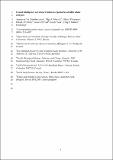Crowd intelligence can discern between repertoires of killer whale ecotypes
Abstract
Call classifications by human observers are often subjective yet they are critical to studies of animal communication, because only the categories that are relevant for the animals themselves actually make sense in terms of correlation to the context. In this paper we test whether independent observers can correctly detect differences and similarities in killer whale repertoires. We used repertoires with different a priori levels of similarity: from different ecotypes, from different oceans, from different populations within the same ocean, and from different local subpopulations of the same population. Calls from nine killer whale populations/subpopulations were pooled into a joint sample set, and eight independent observers were asked to classify the calls into separate categories. None of the observers’ classifications strongly followed the known phylogeny of the analyzed repertoires. However, some phylogenetic relationships were reflected in the classifications substantially better than others. Most observers correctly separated the calls from two North Pacific ecotypes. Call classifications averaged across multiple observers reflected the known repertoire phylogenies better than individual classifications, and revealed the similarity of repertoires at the level of subpopulations within the same population, or closely related populations.
Citation
Danishevskaya , A Y , Filatova , O A , Samarra , F I P , Miller , P J O , Ford , J K B , Yurk , H , Matkin , C O & Hoyt , E 2018 , ' Crowd intelligence can discern between repertoires of killer whale ecotypes ' , Bioacoustics , vol. Latest Articles . https://doi.org/10.1080/09524622.2018.1538902
Publication
Bioacoustics
Status
Peer reviewed
ISSN
0952-4622Type
Journal article
Description
This study was funded by the Russian Fund for the Fundamental Research (grant No. 18-04-00462).Collections
Items in the St Andrews Research Repository are protected by copyright, with all rights reserved, unless otherwise indicated.

